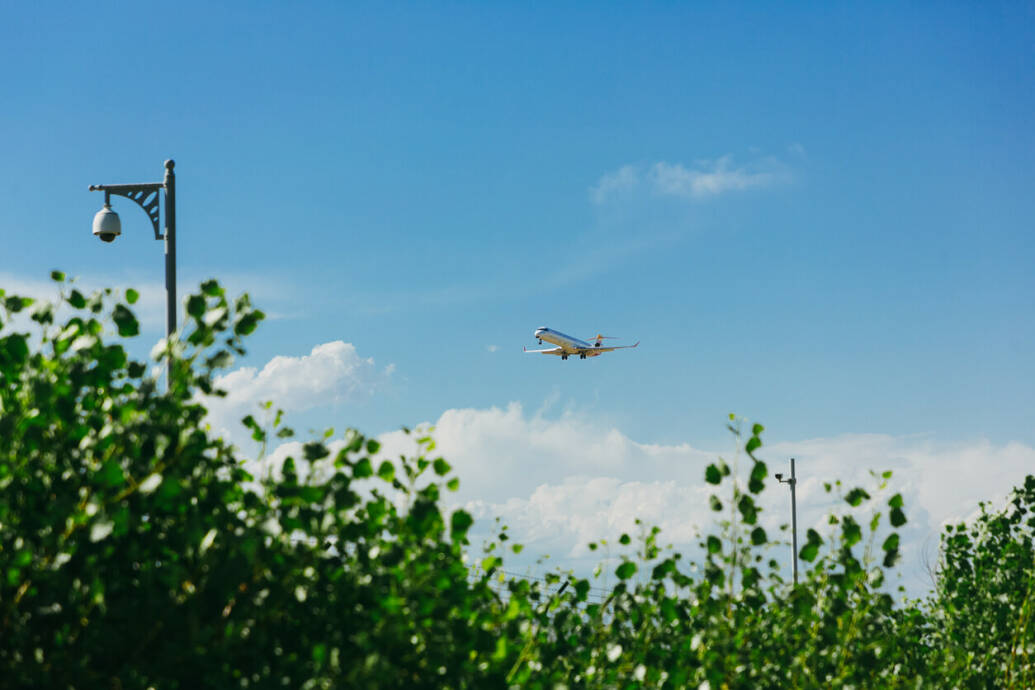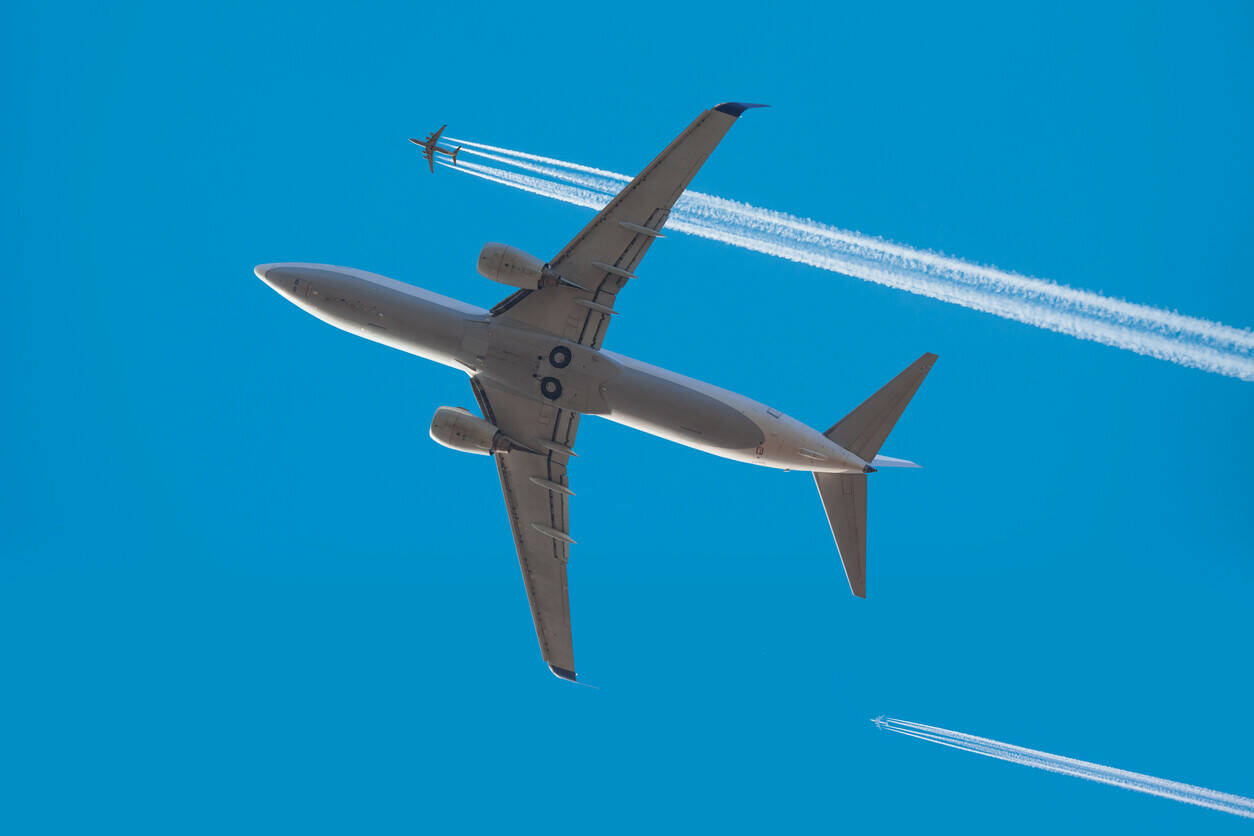Airspace Article


Sophie de Vocht, along with her colleagues, is already busy taking that step towards the future. “Our Strategy department, together with the sustainability team, will be tackling the report over the next few weeks and creating a plan,” she says. “What is necessary to work towards level 4? What do we want to improve and how are we going to do it?
“Monitoring our sustainability steps is an important point in this regard,” she continues. “We have the targets, and we know how we want to measure them. The process still needs to be designed: who is responsible for what, how do we report on measurements, how do we connect next steps? One of our colleagues is already working on indicators for the efficiency of a flight, to measure the sustainability of a flight. Our aim is to share this data on a monthly basis, to enable us to analyse and improve it.”
LVNL is also considering its longer-term future. De Vocht reveals that the military air traffic control and the civil air traffic control in the Netherlands will soon be merged. That will bring forward the sustainability programme.
“If we control the airspace together, we can fly in an even more efficient manner and therefore be more sustainable,” de Vocht concludes. “The same applies to the new iTEC-based Centre Automation System (iCAS), which is currently being worked on, and the Dutch Airspace Redesign Programme (DARP). All these developments will help us to turn that already great Level 3 accreditation into a Level 4 or perhaps even Level 5 accreditation in the future.”
Next steps


“We are honoured to recognise LVNL for their Level 3 achievement in the GreenATM programme.”
Simon Hocquard
Director General of CANSO
LVNL’s efforts have been marked throughout the industry. “We are honoured to recognise LVNL for their Level 3 achievement in the GreenATM programme,” says Simon Hocquard, Director General of CANSO. “This milestone underscores LVNL's commendable efforts in environmental sustainability, reflecting their commitment to driving positive change across various domains.
“Their proactive engagement with employees and airspace users on initiatives with tangible environmental benefits sets a noteworthy example for the industry," he adds.
Michiel van Dorst, CEO of LVNL notes: “We are extremely proud of the GreenATM Level 3 accreditation, making LVNL one of the first ANSPs in the world to achieve this! It's a recognition for the sustainable path we've embarked on as an organisation overall and in our air traffic management. Sustainability has become increasingly important in the aviation sector and for us. Therefore, we gladly take the lead in this area. Additionally, I would like to urge other ANSPs to participate in the GreenATM accreditation programme to take a step forward in their commitment to sustainability.”
Taking the lead

Just like the other ANSPs, LVNL has been rated by independent research agency Think Research in four categories: governance, improved ATM, infrastructure & utilities and other environmental.
A lot of points were scored in relation to efficiency. “Our efforts to optimise wake turbulence spacing, for instance, have led to notable better utilisation of take-off and landing runway capacity at Schiphol Airport,” says de Vocht. “That results in less use of noise sensitive runways. Also, the implementation advanced Global Navigation Satellite Systems (GNSS) navigation, as represented by high levels of performance-based navigation deployment and surface movement optimisation, was rewarded by the GreenATM programme because it significantly reduces excess fuel burn in the air and on the ground.”
Besides these types of efficiency successes, LVNL also excelled in airport and community relations. De Vocht notes that Schiphol is in the Randstad, the most populous area in the Netherlands. This led to LVNL and Schiphol Airport starting the Reduced Nuisance Programme, ‘Minder Hinder Schiphol’, which is based on ideas not only from LVNL, Schiphol and airlines but also from residents and municipal government representatives.
“We are proud of this collaboration, and the joint drafting of measures that should lead to less nuisance for those living in the surrounding area,” said de Vocht.
LVNL was also rewarded for its efforts in relation to sustainable procurement. The GreenATM report states that LVNL’s progress in this topic is impressive due to their sustainable procurement policy and processes that promote socially responsible procurement. “LVNL also makes use of a dashboard to monitor how suppliers are improving their own sustainability,” notes the report.
And LVNL is highly successful in research and development, too. For example, LVNL is one of the founders of the Knowledge and Development Center for Aviation Innovation, a joint venture between Delft University of Technology and Schiphol Airport. And green solutions are being tested in its own innovations center, iLabs, too.
Points for efficiency
CANSO’s GreenATM accreditation programme – which measures air navigation service providers’ (ANSPs) sustainability – is bearing fruit.
After Swiss ANSP Skyguide was the first to obtain Level 3 accreditation in March 2023, LVNL, and the Belgian ANSP, skeyes, have followed suit and achieved the same level.
Sophie de Vocht, Programme Manager for Sustainability at LVNL, believes this is an incredible recognition for the sustainability steps that have already been taken. “And it is a clear motivation to raise our programme to an even higher level,” she says. “Now we have an even better understanding of the next steps we can take to make LVNL even more sustainable.”


Read full article


Sophie de Vocht, along with her colleagues, is already busy taking that step towards the future. “Our Strategy department, together with the sustainability team, will be tackling the report over the next few weeks and creating a plan,” she says. “What is necessary to work towards level 4? What do we want to improve and how are we going to do it?
“Monitoring our sustainability steps is an important point in this regard,” she continues. “We have the targets, and we know how we want to measure them. The process still needs to be designed: who is responsible for what, how do we report on measurements, how do we connect next steps? One of our colleagues is already working on indicators for the efficiency of a flight, to measure the sustainability of a flight. Our aim is to share this data on a monthly basis, to enable us to analyse and improve it.”
LVNL is also considering its longer-term future. De Vocht reveals that the military air traffic control and the civil air traffic control in the Netherlands will soon be merged. That will bring forward the sustainability programme.
“If we control the airspace together, we can fly in an even more efficient manner and therefore be more sustainable,” de Vocht concludes. “The same applies to the new iTEC-based Centre Automation System (iCAS), which is currently being worked on, and the Dutch Airspace Redesign Programme (DARP). All these developments will help us to turn that already great Level 3 accreditation into a Level 4 or perhaps even Level 5 accreditation in the future.”
Next steps
LVNL’s efforts have been marked throughout the industry. “We are honoured to recognise LVNL for their Level 3 achievement in the GreenATM programme,” says Simon Hocquard, Director General of CANSO. “This milestone underscores LVNL's commendable efforts in environmental sustainability, reflecting their commitment to driving positive change across various domains.
“Their proactive engagement with employees and airspace users on initiatives with tangible environmental benefits sets a noteworthy example for the industry," he adds.
Michiel van Dorst, CEO of LVNL notes: “We are extremely proud of the GreenATM Level 3 accreditation, making LVNL one of the first ANSPs in the world to achieve this! It's a recognition for the sustainable path we've embarked on as an organisation overall and in our air traffic management. Sustainability has become increasingly important in the aviation sector and for us. Therefore, we gladly take the lead in this area. Additionally, I would like to urge other ANSPs to participate in the GreenATM accreditation programme to take a step forward in their commitment to sustainability.”
Taking the lead
After Swiss ANSP Skyguide was the first to obtain Level 3 accreditation in March 2023, LVNL, and the Belgian ANSP, skeyes, have followed suit and achieved the same level.
Sophie de Vocht, Programme Manager for Sustainability at LVNL, believes this is an incredible recognition for the sustainability steps that have already been taken. “And it is a clear motivation to raise our programme to an even higher level,” she says. “Now we have an even better understanding of the next steps we can take to make LVNL even more sustainable.”
Just like the other ANSPs, LVNL has been rated by independent research agency Think Research in four categories: governance, improved ATM, infrastructure & utilities and other environmental.
A lot of points were scored in relation to efficiency. “Our efforts to optimise wake turbulence spacing, for instance, have led to notable better utilisation of take-off and landing runway capacity at Schiphol Airport,” says de Vocht. “That results in less use of noise sensitive runways. Also, the implementation advanced Global Navigation Satellite Systems (GNSS) navigation, as represented by high levels of performance-based navigation deployment and surface movement optimisation, was rewarded by the GreenATM programme because it significantly reduces excess fuel burn in the air and on the ground.”
Besides these types of efficiency successes, LVNL also excelled in airport and community relations. De Vocht notes that Schiphol is in the Randstad, the most populous area in the Netherlands. This led to LVNL and Schiphol Airport starting the Reduced Nuisance Programme, ‘Minder Hinder Schiphol’, which is based on ideas not only from LVNL, Schiphol and airlines but also from residents and municipal government representatives.
“We are proud of this collaboration, and the joint drafting of measures that should lead to less nuisance for those living in the surrounding area,” said de Vocht.
LVNL was also rewarded for its efforts in relation to sustainable procurement. The GreenATM report states that LVNL’s progress in this topic is impressive due to their sustainable procurement policy and processes that promote socially responsible procurement. “LVNL also makes use of a dashboard to monitor how suppliers are improving their own sustainability,” notes the report.
And LVNL is highly successful in research and development, too. For example, LVNL is one of the founders of the Knowledge and Development Center for Aviation Innovation, a joint venture between Delft University of Technology and Schiphol Airport. And green solutions are being tested in its own innovations center, iLabs, too.
Points for efficiency
CANSO’s GreenATM accreditation programme – which measures air navigation service providers’ (ANSPs) sustainability – is bearing fruit.

Airspace Article